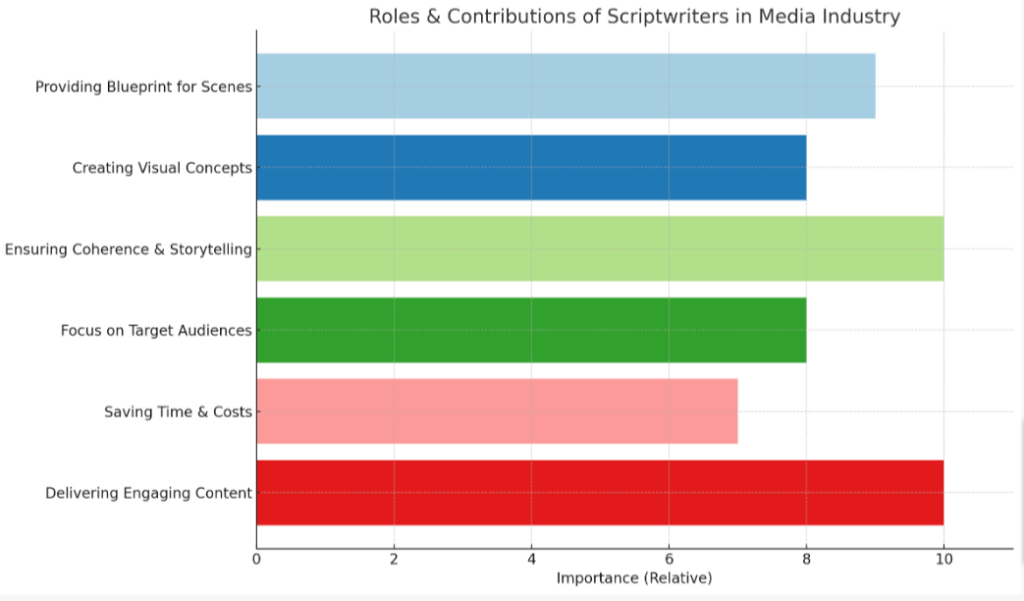Behind the Scenes: The Golden Opportunities in Scriptwriting
Struggling to turn your passion for writing into a lucrative career? You’re not alone. In fact, the media industry is in desperate need of talented scriptwriters who can bring their ideas, dramas and narratives to life.
This article aims to guide budding writers on how to navigate this high-demand field successfully and lucratively. Ready to pen your ticket to Hollywood success?.
Key Takeaways
- Scriptwriting is essential in video production as it provides a detailed blueprint for scenes, dialogue, and actions, ensuring coherence and engaging storytelling.
- Scriptwriters create visual concepts that align with the overall vision of the project, focus on target audiences, save time and costs during production, and deliver attention-grabbing content that captivates viewers from start to finish.
- Aspiring screenwriters can start their careers by understanding the job description, acquiring necessary skills and training, and taking advantage of industry resources such as workshops, writer’s guilds, fellowships/programs, online communities/platforms, script competitions/events/festivals.
The Importance of Scriptwriting in Video Production
Scriptwriting serves as the backbone in any video production process. It translates thoughts and ideas into a visual format that guides directors, actors, and crew members through each scene effectively.
Masterful scriptwriting ensures coherence in storylines making it easier for the audience to follow along.
Without well-crafted scripts, even high-budget films or television shows can fall flat as dialogues might lack depth or characters seem underdeveloped. Just like an architect’s blueprint, scriptwriters lay out the scenes of a film or TV show with detailed descriptions of actions, settings and conversation between characters.
This emphasis on detail gives life to visual media creations enhancing viewer engagement and overall entertainment experience.
Benefits of Scriptwriting for Video Production
Scriptwriting for video production offers several benefits. Firstly, it allows for the creation of a visual concept that aligns with the overall vision of the project. Secondly, scriptwriting helps to focus on the target audience, ensuring that the content appeals to them specifically.
Additionally, having a well-written script in place saves time and reduces costs during production as everyone involved knows exactly what needs to be done. Moreover, effective messaging and storytelling are made possible through scriptwriting, capturing and holding viewers’ attention from start to finish.
Visual concept creation
Visual concept creation is a critical phase in scriptwriting. It involves molding the idea into a vivid, engaging storyline that catches and retains viewer attention. In this stage, scriptwriters transform abstract thoughts into compelling visual narratives.
This process gives life to the narrative and aids in creating palpable atmospheres for viewers. Characters are fleshed out with meaningful arcs while locations become more than just backdrops; they help set tone and mood for deeper immersion into the story world.
The expertise of screenwriters proves essential as they have the capability to create robust concepts capable of driving entire film or television projects forward.

Target audience focus
Understanding the target audience is crucial in scriptwriting. Screenwriters must create stories that resonate with specific demographics, whether they’re writing for film or television.
This focus ensures that the screenplay appeals to its intended viewers, prompting them to tune into shows or purchase movie tickets. As part of this process, scriptwriters often explore rich and diverse characters, storylines, and themes that reflect the experiences and values of their audience.
Audience-focused writing drives viewer engagement, making it an essential aspect of professional scriptwriting in the media industry.
Time and cost efficiency
Scriptwriting plays a crucial role in ensuring time and cost efficiency in video production. By carefully planning the visual concepts and flow of the story, scriptwriters help streamline the production process.
They outline every scene, dialogue, and action, reducing the need for on-the-spot improvisation and saving valuable time on set. Moreover, a well-written script enables filmmakers to accurately estimate budget requirements based on location, props, and special effects needed.
This helps prevent overspending or unexpected expenses during production. Ultimately, by investing in professional scriptwriting services upfront, companies can save both time and money in their video production endeavors.
Attention-grabbing content
Creating attention-grabbing content is crucial in the media industry. Whether it’s for film or television, a scriptwriter’s job is to captivate audiences from the very beginning. By crafting compelling dialogue, exciting plot twists, and memorable characters, scriptwriters can ensure that viewers are hooked from start to finish.
With their creative storytelling skills, they have the power to hold audiences’ attention and make an impact in the competitive world of visual media. By understanding what makes content attention-grabbing and employing effective writing techniques, scriptwriters can contribute to the success of any production.
So if you’re looking to make your mark as a writer in the entertainment industry, focusing on creating attention-grabbing content should be at the top of your list!
Effective messaging and storytelling
Scriptwriting plays a crucial role in delivering effective messaging and storytelling in visual media. Whether it’s a film or TV drama, the script sets the foundation for engaging and captivating content.
Through carefully crafted dialogue, plot development, and character arcs, scriptwriters have the power to captivate audiences and convey important messages. By understanding their target audience and utilizing powerful storytelling techniques, scriptwriters can create impactful narratives that resonate with viewers.
With their words on the page, they bring stories to life and ensure that the intended message is conveyed effectively to the audience.
In addition to conveying messages, effective storytelling is key in keeping audiences hooked from beginning to end. Through compelling plot twists, well-developed characters, and skillful pacing, scriptwriters are able to create gripping stories that hold viewers’ attention throughout an entire film or TV series.
Getting Started as a Screenwriter
To start a career as a screenwriter, it is important to understand the job description, acquire necessary skills and training, and take advantage of industry resources and programs.
Job description
Scriptwriters play a crucial role in the media industry, crafting compelling stories for film and television. They are responsible for creating engaging scripts that capture the attention of audiences and bring characters to life.
This involves developing intriguing plots, writing realistic dialogue, and ensuring that scenes flow seamlessly. Scriptwriters often collaborate with directors and producers to ensure their vision is translated onto the screen accurately.
To excel in this profession, strong storytelling skills, creativity, and an understanding of visual media are essential.
Necessary skills and training
To become a screenwriter, you will need the following skills and training:
- Proficient writing abilities
- Strong storytelling skills
- Creativity and imagination
- Knowledge of screenplay structure and format
- Understanding of character development
- Ability to work under pressure and meet deadlines
- Collaboration and teamwork skills for working with directors and producers
- Adaptability to different genres and styles of writing
- Research skills to gather information for accurate scripts
- Familiarity with industry software such as Final Draft or Celtx
- Taking writing courses or pursuing a degree in screenwriting or a related field.
- Attending workshops, seminars, or conferences that focus on scriptwriting.
- Joining writing groups or online communities to receive feedback on your work.
- Reading scripts from successful films and TV shows to analyze their structure and techniques.
- Writing practice scripts and seeking critique from fellow writers or mentors.
Industry resources and programs
The media industry provides various resources and programs for aspiring scriptwriters to enhance their skills and break into the industry. These include:
- Writing Workshops: Attend workshops conducted by industry experts to learn different writing techniques, get feedback on your work, and network with professionals.
- Writer’s Guilds: Join professional guilds like the Writers Guild of America (WGA) or the Writers’ Guild of Great Britain (WGGB) to access resources, job boards, and legal protection.
- Fellowships and Writing Programs: Apply for fellowships and writing programs offered by renowned organizations like the Sundance Institute or the Warner Bros. Television Writers’ Workshop to gain mentorship, exposure, and opportunities.
- Online Screenwriting Communities: Engage with online platforms like Reddit’s r/Screenwriting or websites like SimplyScripts.com to share your work, receive peer feedback, and connect with other writers.
- Script Competitions: Enter reputable scriptwriting competitions such as the Nicholl Fellowships in Screenwriting or Austin Film Festival’s screenplay competition to showcase your talent and potentially gain recognition from industry professionals.
- Industry Events and Festivals: Attend film festivals, screenwriting conferences, and industry events like South by Southwest (SXSW), Cannes Film Festival, or Comic-Con where you can interact with industry insiders and learn about current trends.
- Local Filmmaking Networks: Join local filmmaking communities or networking groups where you can meet aspiring filmmakers, directors, producers, and other potential collaborators who may be seeking scriptwriters for their projects.
- Online Resources: Access websites such as ScriptMag.com or FinalDraft.com that offer articles, tutorials, templates, and software specifically designed for scriptwriting.
The Current Climate for Screenwriters
Screenwriters face challenges in today’s industry, with lower pay and less experience opportunities. However, guilds and organizations are working to support writers and there are strategies for success.
Discover how scriptwriting can still be a lucrative career choice in the media industry.
Prevalence of lower pay and less experience
Screenwriters often face the challenge of lower pay and limited experience in the industry. Many aspiring writers find themselves working for lower wages, especially when starting out.
This can be due to a lack of bargaining power or being new to the field. It’s important for screenwriters to be aware of this reality and take steps to navigate it successfully. By building their portfolio, networking with industry professionals, and staying up-to-date on market trends, screenwriters can increase their chances of landing lucrative opportunities and gaining more experience in the competitive world of media production.
Efforts by guilds and organizations to support writers
Guilds and organizations in the media industry are stepping up to support writers. These groups recognize the importance of nurturing talent and ensuring fair treatment for screenwriters.
Through workshops, mentorship programs, and networking events, they provide valuable resources to help writers refine their skills, make industry connections, and navigate the complex world of scriptwriting.
By advocating for better pay and working conditions, these guilds and organizations strive to create a more sustainable environment for writers in the entertainment industry.
Strategies for success as a screenwriter
To find success as a screenwriter, follow these strategies:
- Master your craft: Continually improve your writing skills through workshops, classes, and studying successful scripts.
- Build a strong portfolio: Create a diverse collection of scripts that showcase your talent and range as a writer.
- Network within the industry: Attend industry events, join professional organizations, and connect with other writers, directors, and producers.
- Seek feedback: Be open to constructive criticism and use it to refine your work.
- Adaptability is key: Be willing to make changes to your scripts based on feedback or market demands.
- Persistence pays off: Keep submitting your work, even in the face of rejection, and never give up on your dreams.
- Stay informed: Keep up with current trends in film and television to understand what content is in demand.
- Collaborate effectively: Develop good working relationships with directors, producers, and actors to enhance the production value of your scripts.

Conclusion
In conclusion, scriptwriting plays a crucial role in the success of video production. With its ability to create captivating visuals, target specific audiences, and convey effective messaging, scriptwriting is an indispensable skill in the media industry.
Aspiring screenwriters can navigate the current climate by honing their skills, leveraging industry resources, and staying determined in pursuit of their writing dreams. So if you have a passion for storytelling and want to make your mark in the world of visual media, there are plenty of opportunities waiting for you as a scriptwriter.

